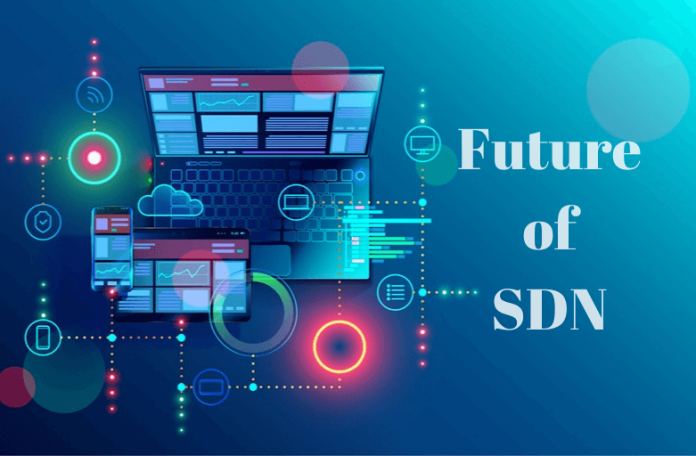Software-defined networking, commonly known as SDN, is an architectural approach towards making a network more programmable by separating the data plane from the control plane, making the control plane independent.
SDN helps a user monitor the network, boosting the user’s ability to respond quickly.
In 2022, the combined valuation of SDN and NFV (network function virtualization) was USD 38457.45 Million in 2022
Also, in 2023, the market revenue of SDN (globally) came out to be $24.5 Billion, and the revenue of SD-WAN was $4.4 billion in 2022.
1. Application:
The NBI (known as the northbound interface) helps in communicating the network resources and devices with the controller.
2. Controller:
Here, the controller helps in translating the requirements that SDN raises to the datapaths.
3. Datapath:
Datapaths are important as they help in the movement of the data packets within the network.
4. API:
API, known as the application program interface, helps provide open communication between the routers present in a network and the controllers.
1. Network infrastructure can be customized
The administrators can do this by configuring and allocating virtual resources from a centralized location within a network.
2. Secure:
SDN is secure and gives users a holistic view of the whole network. Further, helps them know about the threats present in the network. Developers can segregate the devices as needed for security and quarantine the affected devices.
3. Control:
The admin has full control over the traffic flow within a network. The admin can make the essential changes within a network as per the requirement.
4. Highly flexible and faster:
The administrator can deploy applications with the help of open APIs. Also, the integration of third-party products is possible.
5. Building programmable networks:
The application configuration can be done automatically by programming, and the admin can eliminate the old manual configuration for programming the network.
For many years, we have seen the telecom industry changing rapidly. With the evolution of 4G technology, there is still a need for a more agile, speedier, and flexible network, which makes the base of 5G technology.
5G technology has not yet been fully exploited and will play a vital role in the future. In the future, 5G will surely rely on SDN.
This move will make 5G and open-source networks a hot combo in the worldwide telecom industry.
Today, Wi-Fi is the most common thing we use to connect with each other, whether it is for personal use or for business purposes.
5G will help businesses solve connectivity issues and provide a secure platform for them.
Providing lower latency and a competitive price, 5G technology, and SDN, in combination will help to improve customer experience across many platforms.
Networking is the backbone of any company nowadays. In the manufacturing sector, there’s a need to connect each supplier, manufacturer, and distributor with each other to continue smooth operations in coordination.
For this, the manufacturing plant needs to connect with the headquarters, and the plant itself should be equipped with sensors, IoT devices, and other devices.
5G connectivity will even resolve the problem of connecting sensors in manufacturing plants. The best part is, 6G technology is also expected to launch by 2030.
SDN is still in its early stages, as very few people have training on it. It will gain even more popularity as more and more of the workforce will receive its training.
Being one of the technologies to be designed for networking control, the future of SDN lies in its current situation.
SDN is still an emerging technology, and it has to overcome the challenges so that it doesn’t get hacked by someone.
Many companies are now moving to the cloud. SDN will help companies to enable the virtualization of their networking infrastructure.
Moreover, people know it for its ability to easily shift to cloud technology.
As of now, SD-WAN is on the rise as the network covers a wide area. This will decrease the cost of operation in a wide area with centralized control.
SDN can run on automation, which means you have to feed instructions, and other things will work accordingly. This will make it easier for administrators to monitor the network.
Every company that has its own network should be keeping an eye on the future trends of SDN, as this will benefit them directly.
The presence of SDN in the future will enhance a company’s productivity and security without compromising the operating cost.
It is an open-source technology, but you do not need to worry as SDN has its network monitoring system, which has centralization features.
In the coming future, SDN will become a technology that will be more responsive, fully automated, and highly secure.
In the near future, you may also get to know about software-defined mobile networking (SDMN), which will make the mobile network controllable from software.
Also, experts estimated that the global SDN market will grow up to $60.2 Billion by 2028 at a whopping CAGR of around 19.7%.
Conclusion
As more and more companies continue to move closer toward the digitized states, the need for a secured and cheaper network will make the shift toward SDN in the coming future.
Using SDN technology, an enterprise can solve traditional networking challenges like latency problems, bottlenecks, and geo-boundaries, thus creating a more responsive network strategy.
Recommended For You:

